

#Sample cv in german format professional
Make sure to use a professional photo, preferably by a professional photographer. It is considered to make the CV more personal and increases the chances of being invited to an interview. In Germany, although it is not mandatory, it is strongly advised to add a photo to a CV. Photos are considered unnecessary as it says nothing about your skills and can lead to discrimination. In fact for some office jobs it is a no-go. In the UK or USA adding a photo to your CV is not common practice. Optional a LinkedIn profile, but again only if it is updated and representative. In an English CV you would only add these personal details: Optional a LinkedIn profile, but only if it is updated and representative. Not all are necessary, add the ones that you feel comfortable with sharing. While in an English CV you don’t provide a lot of personal details, a German CV includes a little more details. When creating a German CV, here are a few things to keep in mind: Then you can allow some more ‘modern’ CV layouts instead of the basic, straightforward CV that is appreciated by most German HR professionals. Before you apply it is wise to find out whether the company you are applying at is of German origin and thus has a German corporate culture or whether the company has more of an international culture. There are a number of noticeable differences between an English and German CV. The comparisons made are based on these formats.ĭifferences and main focus areas for a German CV In this article we talk about an English CV with which we refer to the American or British format. The German word for CV (which is an abbreviation for the latin words curriculum vitae) is Lebenslauf, the word CV is not or seldomly used. In this article our partner gives you tips & tricks and common translations for your German CV.

This shows that you are also able to speak German, something that is highly valued. When you are applying for a job in Germany it is advised to send a German CV (Lebenslauf).

However, in most German companies the most spoken word is still German and a certain level of German is often required for a job in Germany. The business language in a growing number of companies is English. Nelson is one of the founders of feminist economics and presents feminist perspectives on the economics of care, ecological economics, behavioral economics, and the theory of the firm.Due to the continuing globalization companies in Germany are more and more internationally oriented. Nelson discusses issues of economics, gender, and community knowledge in two recent articles on “ Economics, Considered ” and “ Economics and Community Knowledge-Making ”. See the original article by Moomaw et al. GDAE Co-Director William Moomaw is featured in a New Yorker article by Bill McKibben who cites Moomaw’s research on “proforestation”- growing existing forests intact to their ecological potential-as an alternative to unsustainable policies of burning biomass. See original article and other work by Wise on the promise of ecological agriculture in Africa, as well as the social and ecological damage from intensive agribusiness. Wise has a new article on the promise of ecological agriculture in Africa, as well as the social and ecological damage from intensive agribusiness. GDAE Researcher s have new published work on important frontier areas in economics and ecology.

The presentations emphasized lessons from the preparation of the fifth edition of Environmental and Natural Resource Economics: A Contemporary Approach: the increasing evidence of the severity and urgency of climate change, increased ambition for carbon reduction goals, and the essential role of renewable energy, energy efficiency, and carbon storage in soils and forests in achieving these goals. Jonathan Harris, Getting to Net Zero: Ecological Economics Can Help.īrian Roach, Jonathan Harris, and Anne-Marie Codur, Teaching Ecological Economics: Energy, Climate, Growth, and Degrowth and Changing Economics of Renewable Energy. GDAE Researchers presented at the Online Joint Conference of the International Society for Ecological Economics, the European Society for Ecological Economics, and the international degrowth research networks, hosted by University of Manchester, UK, 5th-8th July 2021.Īnne-Marie Codur and Sam Polzin, Farmers as Ecosystem Regenerators: A Case Study of the Northeast Healthy Soil Network. GDAE Researchers Present at Ecological Economics/Degrowth Conference


 0 kommentar(er)
0 kommentar(er)
